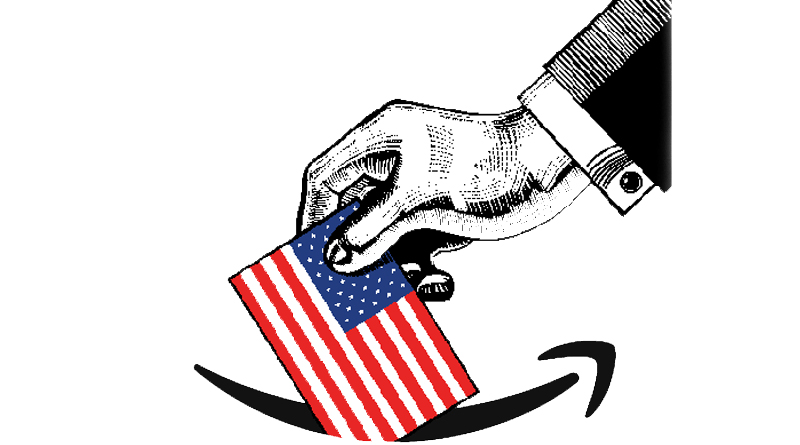

Nandita Bose -
Amazon.com Inc’s cloud computing arm is making an aggressive push into one of the most sensitive technology sectors: US elections.
The expansion by Amazon Web Services into state and local elections has quietly gathered pace since the 2016 US presidential vote. More than 40 states now use one or more of Amazon’s election offerings, according to a presentation given by an Amazon executive this year.
So do America’s two main political parties, the Democratic presidential candidate Joe Biden and the US federal body charged with administering and enforcing federal campaign finance laws.
While it does not handle voting on election day, AWS — along with a broad network of partners — now runs state and county election websites, stores voter registration rolls and ballot data, facilitates overseas voting by military personnel and helps provide live election-night results, according to company documents and interviews.
Amazon pitches itself as a low-cost provider of secure election technology at a time when local officials and political campaigns are under intense pressure to prevent a repeat of 2016 presidential elections, which saw cyber-attacks on voting systems and election infrastructure.
“The fact that we have invested heavily in this area, it helps to attest to the fact that in over 40 states, the Amazon cloud is being trusted to power in some way, some aspect of elections,” Michael Jackson, leader, Public Health & US Elections at AWS, told prospective government clients in February via a presentation on a webinar.
The company’s efforts are welcomed by election administrators, who in interviews said they often struggle with keeping outdated systems up to date at the local level.
In Oregon, for example, the state’s in-house servers that support election services shut down every time there is a power outage — an often occurrence as Oregon updates its electric grid, according to Peter Threlkel, chief information officer at the Oregon Secretary of State.
A move to the cloud fixes that problem, and Oregon ran a pilot with AWS to move its voter registration system to the cloud, he said.
Some security experts like David O’Berry, co-founder, Precog Security, said moving to AWS is “a good option for campaigns, who do not have the resources to protect themselves.”
Still, Amazon’s growing presence in the elections business could undermine what many officials view as a strength of the US voting system: decentralisation.
Most security experts said that while Amazon’s cloud is likely much harder to hack than systems it is replacing, putting data from many jurisdictions on a single system raises the prospect that a single major breach could prove damaging.
“It makes Amazon a bigger target” for hackers, “and also increases the challenge of dealing with an insider attack,” said Chris Vickery, director of cyber risk research at cybersecurity startup Upguard.
A recent hack into Capital One Financial Corp’s data stored on Amazon’s cloud service was perpetrated by a former Amazon employee. The breach affected more than 100 million customers, underscoring how rogue employees or untrained workers can create security risks even if the underlying systems are secure.
Amazon says its systems are reliable. “Over time, states, counties, cities, and countries will leverage AWS services to ensure modernisation of their elections for increased security, reliability, and analytics for an efficient and more effective use of taxpayer dollars,” an AWS spokesperson said.
Amazon’s push into the election business comes as the company faces criticism from politicians, labour unions and privacy advocates over its business practices and growing influence. President Donald Trump has accused the company of competing unfairly and repeatedly attacked the Washington Post, owned by Amazon CEO Jeff Bezos, for alleged bias, a charge Bezos and the paper deny.
Amazon is forging ahead. It now powers the websites for the Federal Election Commission (FEC), the Republican National Committee (RNC) and the Democratic National Committee (DNC), according to a source and election security experts.
The FEC, DNC and RNC declined comment. A person familiar with the DNC’s plans said the committee has recently moved some data from AWS to Alphabet-owned Google cloud but did not explain the reason for the shift.
Amazon has also won over major individual candidates, the executive leading the company’s election push said earlier this year.
“Some of the largest presidential, congressional and gubernatorial campaigns are also trusted to AWS,” Amazon’s Jackson told clients in the February webinar.
For example, Democratic Presidential frontrunner Joe Biden’s online fundraising operations rely on AWS, a source with knowledge of the matter said. The Biden campaign did not respond to requests for comment. In the past, AWS powered the Obama for America campaign in 2012, the source added.
The privatisation of voting infrastructure is part of a broader trend that has swept across nearly every aspect of government activities in America — from parking tickets to prisons — and continues under the Trump administration.
Microsoft Corp’s Azure, the biggest rival to AWS, has a sizeable government business and offers some election services but it has not focused on them and lags Amazon, according to companies who partner with both firms for government contracts.
Amazon is also competing with traditional election technology vendors including Elections Systems & Software (ES&S) and Dominion Voting Systems Corp, which offer some similar services such as election night reporting and data storage, according to consultants. — Reuters
Oman Observer is now on the WhatsApp channel. Click here



